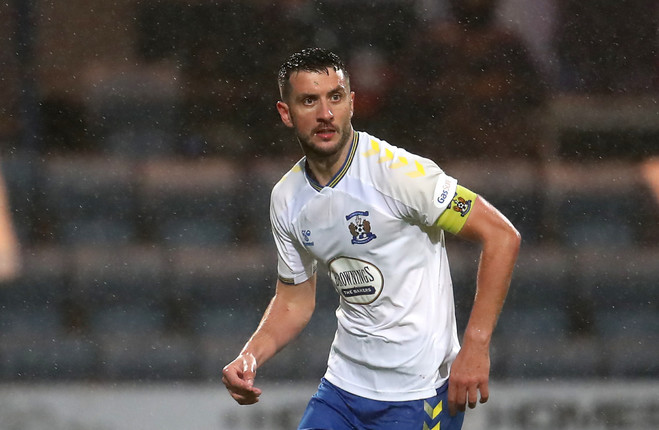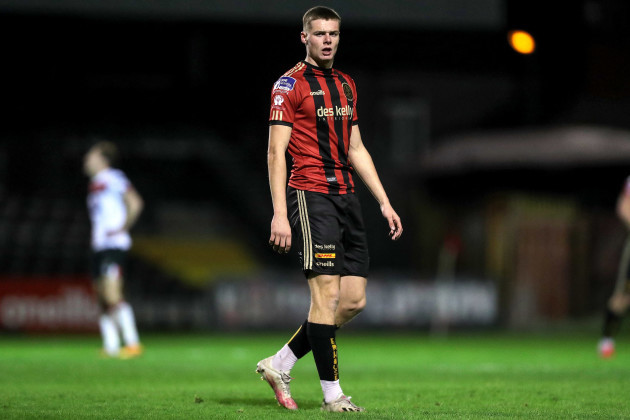LAST UPDATE | 2 Oct 2021
AN INTERESTING TREND is taking root at English football academies: the signing of an overage player-coach for the club’s U23 side.
Former Irish U21 international Gary Dicker has returned to Brighton to take up the role, and a couple of weeks after he was appointed, another Irishman, Paul McShane, assumed a similar job at Manchester United.
“It’s a perfect situation for me, I’m still young enough to play and train and I’m getting some coaching at the same time at a fantastic club”, Dicker tells The42. “At this stage of my career, it’s looking to the next step.”
The Dubliner made more than 150 appearances for Brighton in the second and third tiers of English football and most recently found a home at Kilmarnock in Scotland, for whom he played almost 200 times.
Now 35, he has returned south to soak in something new while passing on what he already knows.
He trains and plays regularly with the U23s, while also running set pieces and coaching on the days he doesn’t train.
“Now I’m on the opposite side of the fence, you can see the amount of work that goes on.
“You’re not just rocking up for training and then leaving. Ive got normal hours now: I’m in until six or seven every night. Whether it’s working on training, clipping videos to watch opposition, doing clips of lads where they can improve or watching training back: there’s so much going on behind the scenes. It’s a massive learning curve and one I’m really enjoying.”
His presence on the pitch and in the dressing room is about illustrating example.
“It’s really to set standards and demands on players, and to help them as well. In games and in training, and to show every day matters as a footballer: it’s a chance every day to impress somebody.
“You’ve seen certain scenarios a million times, or certain pictures on a pitch, that you only get from playing the game. A lot of the young boys won’t have played a lot of games, so that’s an area we are trying to improve.
“That’s where you learn most: playing matches. Training ground you work on a lot of things, but game time is probably the most important thing. You learn from that, and I’ve played nearly 600 games.”
Dicker spends matchdays in the dressing room, and the generational gap between he and his team-mates was probably most obvious when he told Evan Ferguson he had played against his father, Barry.
Some things have changed in the dressing room, of course, but other things never will.
“The dressing room – regardless of what age you are – there’s terrible music playing.
“But society has changed in general. That’s just how it is. Everyone wants to bring up the past and say ‘this was better’, but that’s just how time changes.
“Nokias were only just coming out when I was starting out, but different people have always had different ways of preparing for games. People have always been different. Here, we’ve tried to make it a first-team environment. There are fines: you can’t be late for meetings and you can’t be on your phone on a matchday. It creates a good team spirit.
“It’s changed, but everywhere has changed and you have to move with the times. Otherwise, as a player or as a coach, you’ll get left behind.”
Being left behind in a different way is the great anxiety of young academy players, and first-team manager Graham Potter was blunt when he spoke to the U23s ahead of the season’s start.
“Not every one of you is going to come across to this side of the building”, he said. “That’s just life: sometimes things aren’t fair. I can tell you to do this and to do that and you’ll definitely be over here, but I can’t guarantee that. But if you do all of the right things, you will have a career in football, whether it’s here or at another club.
“I wish I could take 23 of you over to the first team and guarantee you will all be Premier League players, but I can’t. That’s not to say you won’t have a good career in football. You might have to go down two or three levels and then come back to the Premier League.”
The club share a stat with those starting out with their U23s: 70% of the players who were still at Brighton by the age of 23 have gone on to have professional careers in the English Football League.
Dicker uses an analogy to illustrate divergent paths: while some academy players take the lift to the top of the game, others have to take the stairs.
Brighton are as good a Premier League club as any from where to catch the lift, mind, as they had the highest number of minutes played among Academy graduates in the Premier League last season.
“It is unbelievable”, says Dicker. “Man United were second behind us. For a club that, 10 years ago, had only three or four full-time staff working in the academy, to have the most minutes in the Premier League is down to 10 years of hard work from everyone at the club.”
He name-checks the work of the club’s Technical Director, Dan Ashworth, and Academy Manager John Morling, who was once the head of the FAI’s Emerging Talent Programme.
“The club has come on and it has shown the players a pathway, to the first team or to another first team. A lot of care goes into it: they do work with a psychologist about meeting goals, and you’ll have continuous meetings with the lads to see how they are. We’re always looking to improve people.”
The same attention is given to players out on loan, with one player recently sitting down for a two-hour Zoom meeting with coaches, the loans manager, and a sports psychologist. ”It’s not about how he’ll do and how many games he’ll play, this was about how we can support him in the year he’s away”, says Dicker. “Sometimes players are sent out on loan and they might get a text message to say, How are you doing, but the club are really hands-on in that area. They care about every player, and that’s great to see.”
Given Dicker’s dressing room includes underage internationals Evan Ferguson, Andrew Moran, James Furlong and Matt Everitt, Brighton’s academy is of particular interest to Irish fans.
Ferguson and Moran have already made their senior debuts, coming on in Brighton’s Carabao Cup victory against Cardiff last month. Given he’s still only 16 and yet has already been capped at Irish U21 level and by the Bohemians first-team, Irish hopes are particularly high for Ferguson.
“If he won the lotto tomorrow, Evan wouldn’t change”, says Dicker. “He doesn’t get too high or too low, which is a good thing.”
See when he returned to the U23s set-up after his first-team bow.
“If you tell someone they are going to make their debut for a Premier League club at 16 or 17, most wouldn’t know how to react.
“But they came back into training the next day and you wouldn’t know anything had happened. They were back to work and back on it, which is a credit to them.
“It’s another area we do meetings on: pre-mindset when you’re making your debut, and post-mindset, on what you do after you get it.
“Sometimes it happens to young players that they get that and they find it hard to keep it going. They are young, their minds can wander, and they can think, ‘What’s left? I’ve made my debut.’
“A really important part of the development of a young player is after their debut. After that massive high, when you come back down to the 23s, How’s your attitude going to be? Is your attitude right, or do you think you shouldn’t be here? Are you going to keep your standards high and show why you got your chance?
“Seven lads have made their debuts this season, they have all come back to down to our team and played for us on the Friday or the Saturday, and they have probably been our best players. That’s a credit to them and a credit to the group.”
And a credit to their fellow team-mate and coach.



